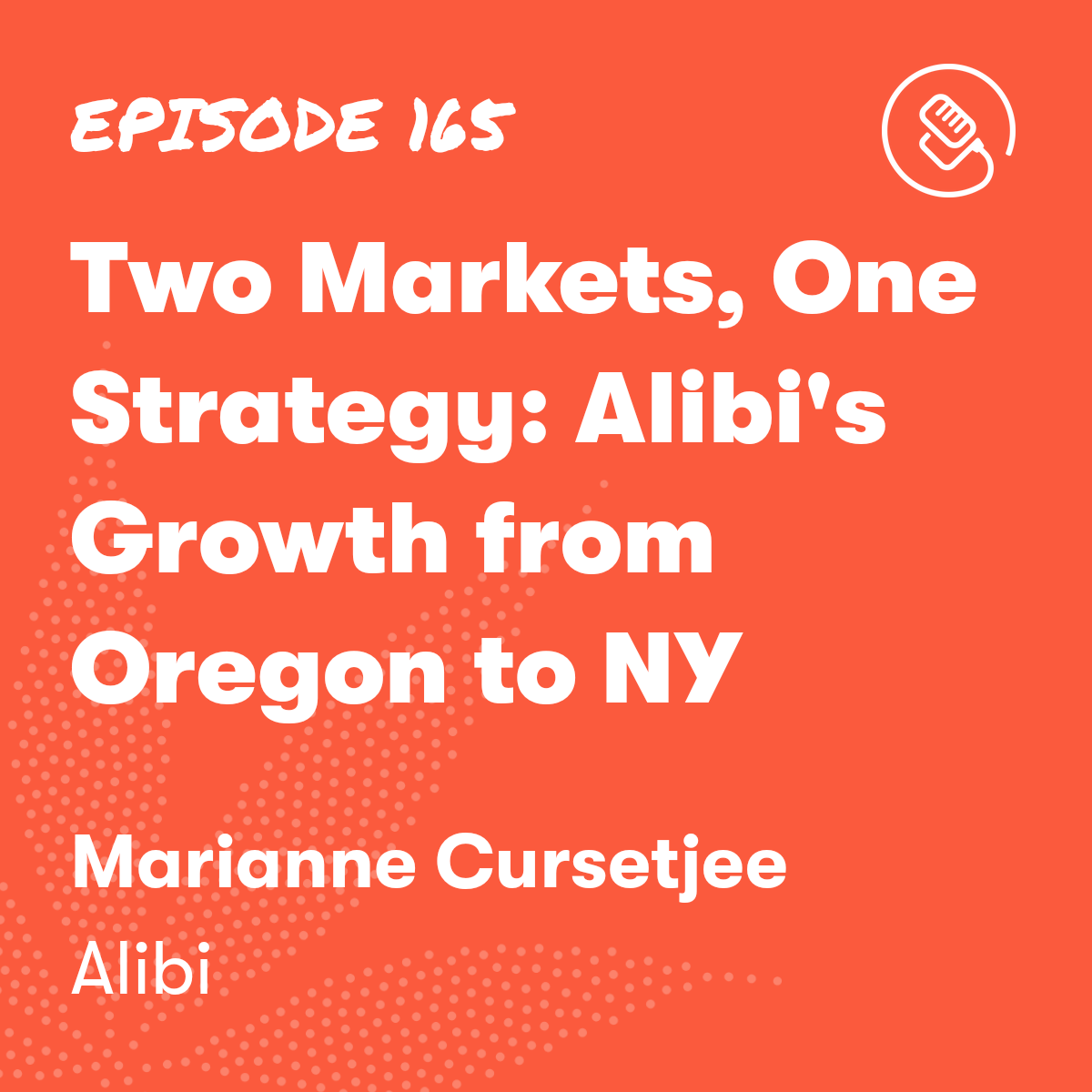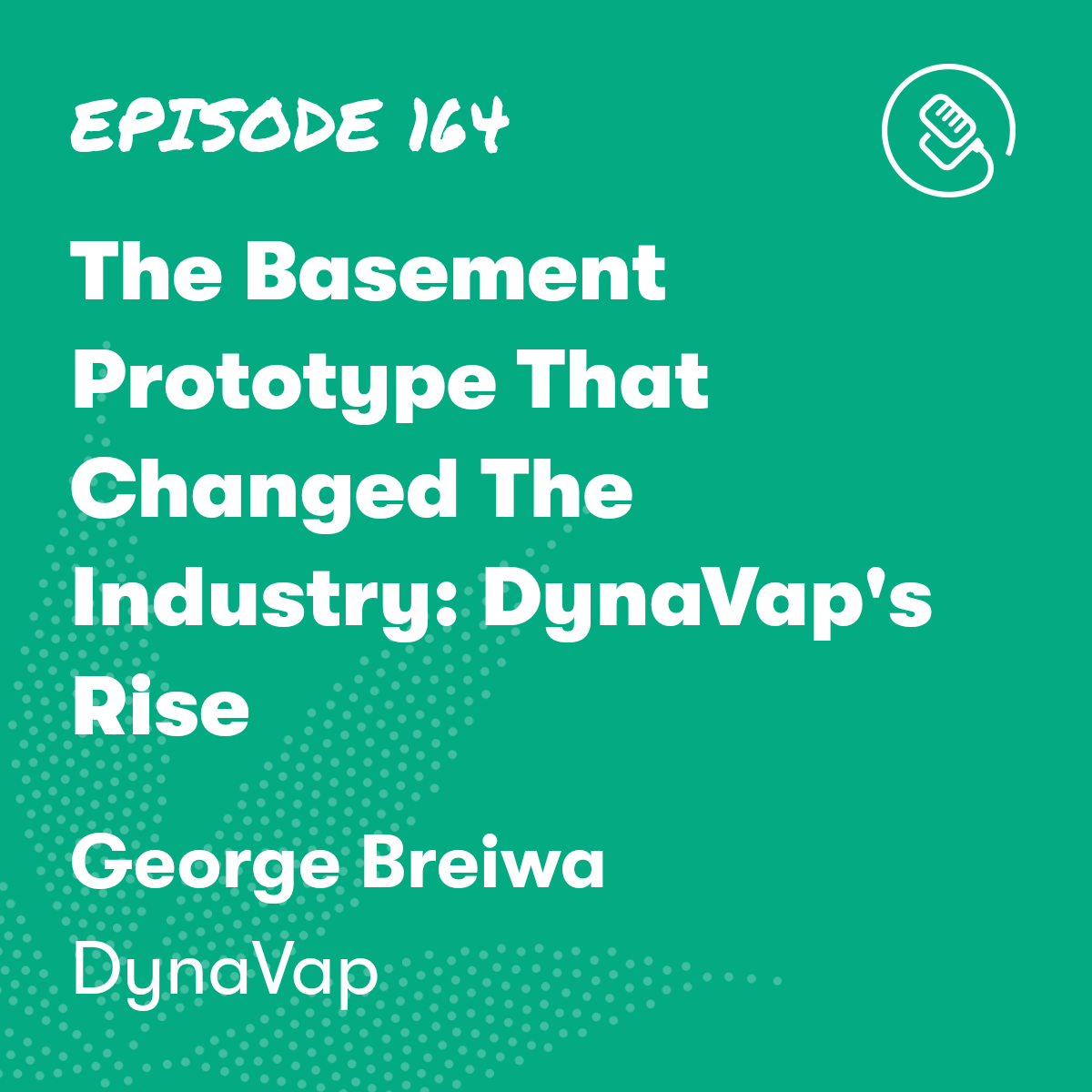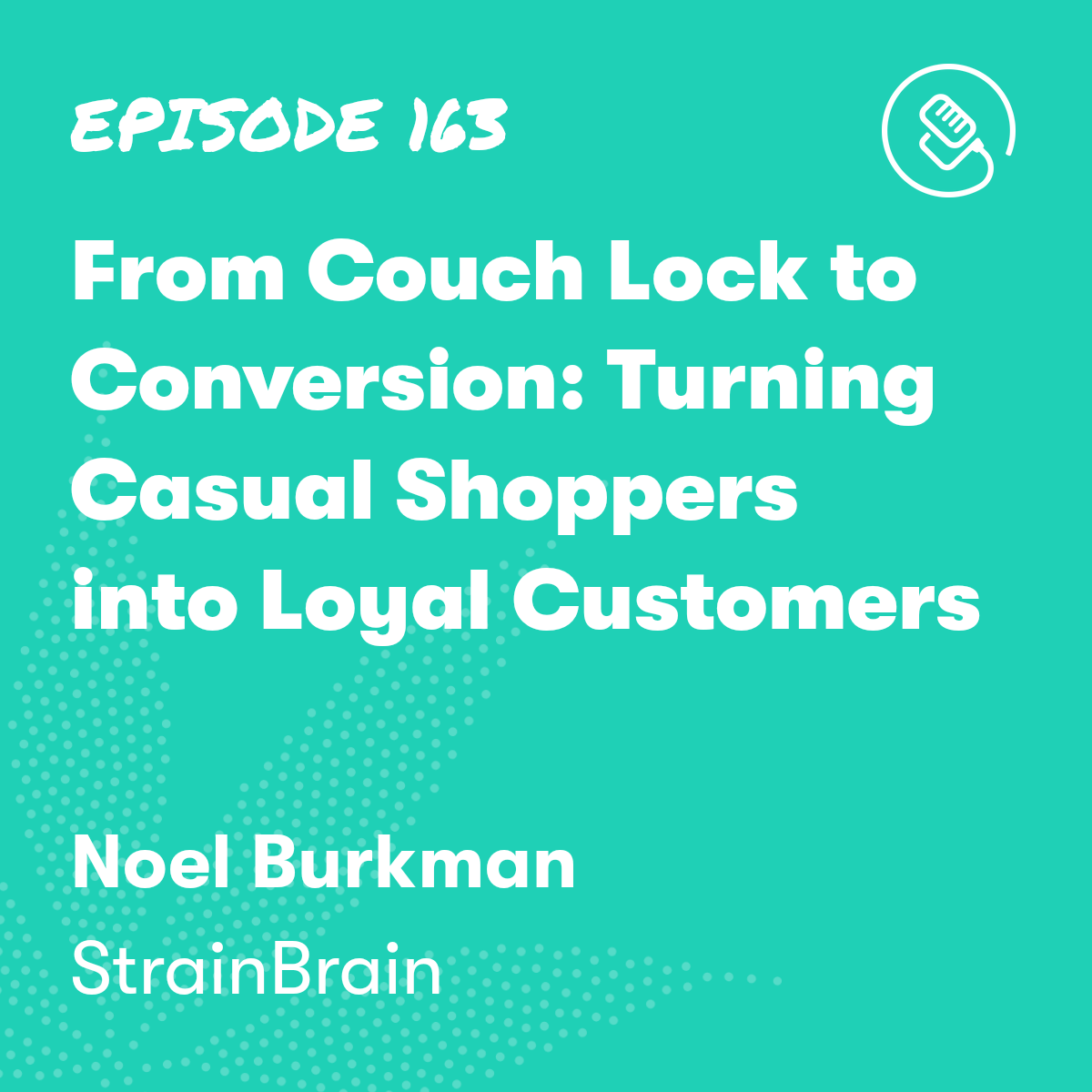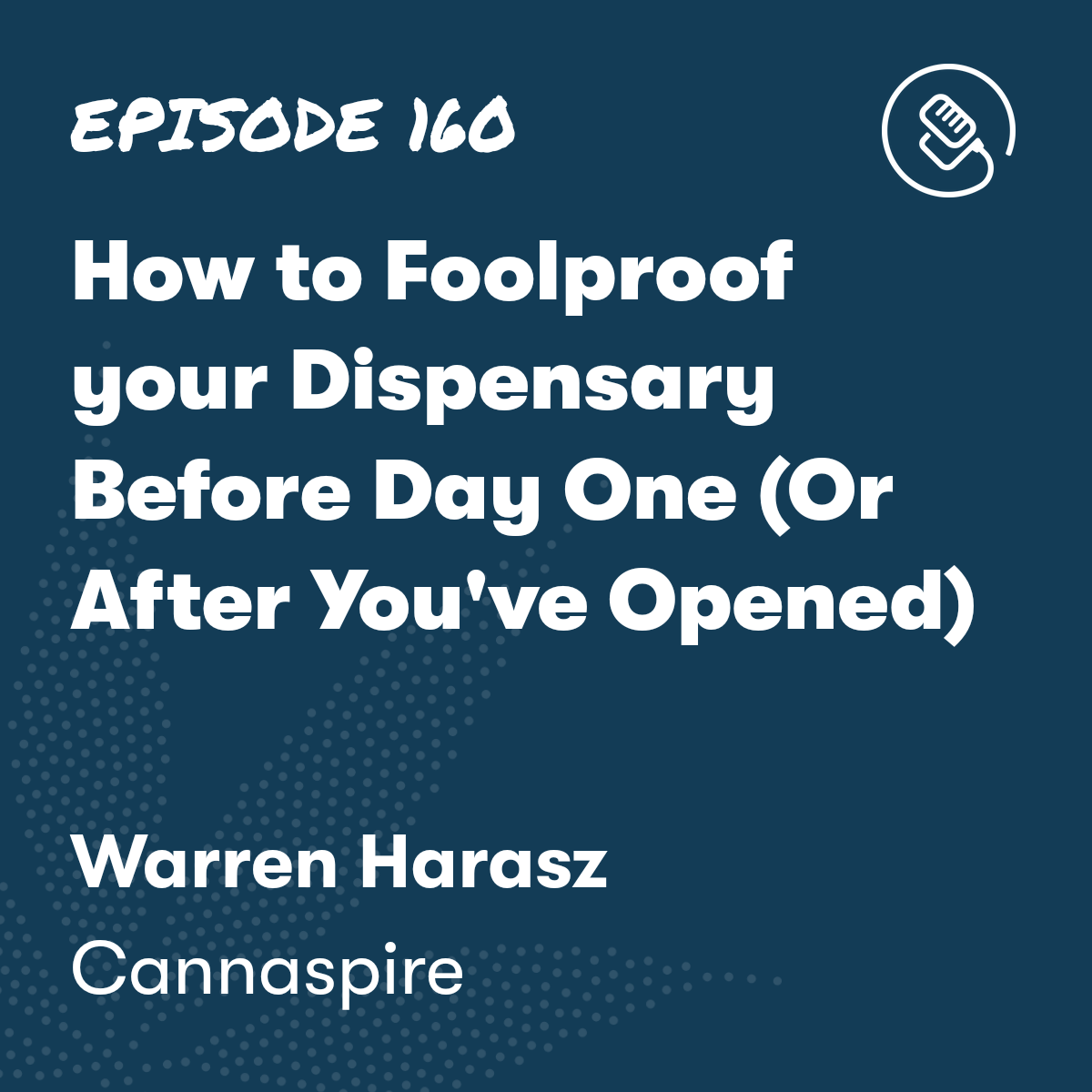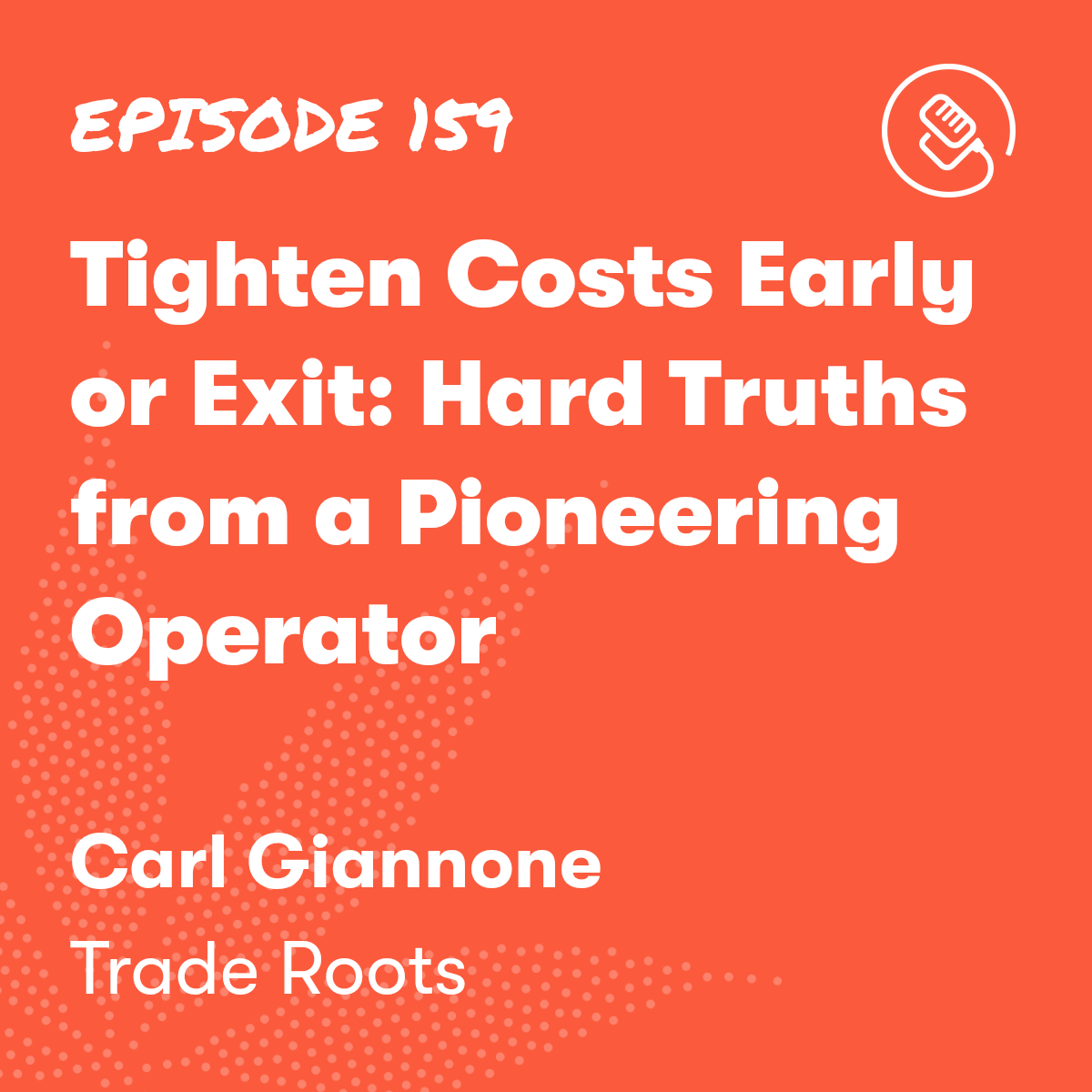

Buy, Sell, BLAZE: The Challenges of Running a Dispensary
Episode Description

Episode Transcript
Shahbaaz Kara-Virani: [00:00:00] That's what keeps me in the industry is the fact that like we're really at the beginning and I know everyone who you talk to who's been an OG, I mean you've been in this game for 12 years but you know in another 12 years where is this industry gonna be, right? That's why, one of the reasons I really want to see cannabis rescheduled in the U. S., because that'll be such a cataclysmic event, monumental event for the rest of the world.
Intro: Welcome to the Kaya Cast, the podcast for cannabis businesses looking to launch, grow, and scale their operations.
Tommy Truong: Shahbaaz, thank you so much for joining us today.
Shahbaaz Kara-Virani: Tommy, what's up? It's it's a real privilege and a pleasure to be here with you. Thanks for having me.
Tommy Truong: You have quite an extensive experience in the cannabis industry. You've started in really a lot of different I would say different verticals in the industry. So let's, where are you today?
Shahbaaz Kara-Virani: As of Monday January 6th, I actually just joined [00:01:00] Blaze as the vice president of growth. I'm I'm now back in the POS game and the e commerce game and the payments game after, Two and a half year hiatus, full time, but yeah back in this game, back in the retail technology stack game and really excited to be here because I think there's a massive opportunity to provide retailers with the technology that they they need and the right, partners like like yourself.
Tommy Truong: Wow. Congratulations. I. So you've, now joining Blaze, you've worked at Dutchie, you're gonna work at Blaze you've probably seen quite a few environments, what is the biggest feedback that you would have when somebody is implementing new technology?
Shahbaaz Kara-Virani: So the biggest feedback piece of feedback I can have is figure out how, first of all, as an operator, you buy technology and what your criteria is everything from your timelines to your pricing model and budgets as well as your change management. It's not as simple as I get this new shiny new technology and everything's going to [00:02:00] be perfect.
There's a learning curve, every technology, regardless of how similar certain features and feature parity there is everything has a little bit of a learning curve. Prime example. I recently switched from Android after 12 years to. And all my contacts didn't transfer over and I didn't know some of the different screens and things like that.
So there's always a learning curve. So account for that change management and and really work with your vendor, with your technology provider to understand how to really drive that change management and get the most out of it in quick succession. Because technology should be working. For you and with you, not against you and, taking your time up.
Tommy Truong: What are some of the biggest mistakes that you see? Operators make,
Shahbaaz Kara-Virani: I think I think some of the biggest mistakes that operators make genuinely are budgets are tight in this industry. Capital is hard to come by naturally. And so a lot of operators might be drawn [00:03:00] to the lowest cost provider or a free provider. But typically if you're getting a free service, then free is what you pay for it.
And also free is Is, you're the product essentially, so I think a lot of the time, whether it's, free or next to free, I think that's a really challenging position because you have to understand that good teams cost money, good innovation costs money good support costs money.
And so technology as your core piece of enablement for your store and for your livelihood to get that revenue, especially without traditional banking, traditional advertising, all these different things. You really need to make sure that the company that you invest in is going to invest back in you because you never want to go through another technology evaluation.
It's a it's time consuming. You have to retrain people. So on and so forth and my suggestion would always be take your time and do it right the first time rather than, 10 months down the road when you have, an X amount of stores and so on and so forth and more employees and you have to do [00:04:00] it cause that's going to be a little bit more of a headache for sure.
Tommy Truong: I couldn't agree with you more in that if you are evaluating technology, if you're listening and you're evaluating technology, I would first think, Hey, am, if I quarter to five stores, will I be happy with this? And probably number two is customer service. When things hit the fan, what happens? Inevitably things will hit the fan. Nobody's perfect. If you operate long enough, there's going to be hiccups in place. What happens when, what things do?
Shahbaaz Kara-Virani: Big time. And you want to know if someone's there for you well after the sale, I think in general, there's this there's this, romance with the net new customer. And sometimes we can forget about the organization that's helped us get there. And so really, who's going to be with you throughout the duration of your lifetime is really important and who's going to understand your business.
As well or if not better than you so that they can help give you the recommendations and scale with you [00:05:00] because it's really what a technology provider should be doing, not just, providing the technology.
Tommy Truong: You've seen a lot of environments in this industry. You've probably worked with hundreds of operators. And from a marketing perspective at Lyft, how to maximize your footprint or, your exposure to all the way through Implementing technology. What are some of the Sorry, let me just think about a way to word this and tee this off for you. If you, Shahbaaz, if you were starting a dispensary today, and this is gonna be, it's a very broad question. If you were starting a dispensary today, what would be your first five moves?
Shahbaaz Kara-Virani: Oh God, that's a good question. Putting me on the spot, but I think I know because I've thought about it a lot. Okay. So number one my first move would be to make sure that I understand my location [00:06:00] really well. That's the biggest thing is look, no matter what it is, your location, if you have the right foot traffic, if you have, in your rural area, you have the right parking spaces things of that nature.
Understand the geography and the demography but, around your location, that's 100, 000 percent number one is what I'd make sure I do. Obviously the associated landlord and, so on and so forth. You want to know that you're going to be able to sell that store should you want an exit in the future or you're going to want to know that store has value and location most times plays a huge factor in it, especially with the regs and different pieces.
Number two, I would have a really good type. Profit and loss statement. I with, sensitivity built in for all sorts of different externalities that could arise. I think oftentimes early in industries, early in marketplaces Emerging markets, you have, a variety of different kind of, money coming in and a lot of speculation and a lot of hope.
But [00:07:00] oftentimes, you can't control the regs. Most times, but you can't control the regs as a, as an operator. And, to take Toronto, Ontario, for an example, you had stores right beside each other on Queen Street. And no investor could ever seen that. So accounting for really tight PNL with sensitivity built in is really, worst case scenario, medium case, best case is really what I would do because once you have that, you can start to actually manage your cash.
Accordingly, third thing is I would hire and train really good. People pay a little extra for the right people because turnovers rampant in this industry And it's really hard to find people you can trust and as an owner You can't be everywhere all at one time. You can't see everything with that training.
I would invest in You know great sales enablement tools for my staff and really teach them emotional because oftentimes I find when you walk into a dispensary there's not a lot of discovery going on, right? There's not a lot of trust and rapport building. And that's, 99 percent of the problem is, [00:08:00] for instance, I'm from East Africa.
I'm actually in my parents office right now. My mom walks into a dispensary that could literally be her last. Last walk into a dispenser if she has a bad experience. Recognizing that it's still a very vulnerable buying experience is extremely important. The fourth thing I'd do is I'd buy an amazing tech stack and make sure that I understand each of its components.
But I wouldn't buy it all at one time. I would really space it out. And what I mean by that is, you gotta get your core competencies. You gotta get, your point of sale, Blaze. You gotta get e comm and payments. You got to get, your, your payroll, your HR you got to get push obviously, right?
KayaPush, you got to make sure that you have the core components of the stack. And then as you start to build your customer base, maybe you expand into loyalty, right? And so having a road map for your technology, so that's number four. And then number five, the fifth move I would make is I would start to understand and see outside of this industry, what the best retailers have done and start to try and understand the regs and [00:09:00] mimic the things that those retailers have done within my interpretation of the regs and my risk profile in the regs.
So stores like Sephora, Starbucks Nike, why do these stores? exists. Why are they so powerful and why they have longevity? So starting to understand implementation around those, whether it's SEO, whether it's writing the right content, et cetera, et cetera.
So those are like the first four or five moves I would make. What do you think, Tommy? Did I pass or did I fail?
Tommy Truong: No, this, these are all really good points and It's funny. My, my sister in law is opening up a store right now, right? Not a cannabis store, but a a bubble tea shop.
Shahbaaz Kara-Virani: Oh, nice. Yeah.
Tommy Truong: planning through location, budget, all of these different things. And I'm helping her with her budget. And the first question that I had for her was what's your breakeven, right?
How much cash do you have [00:10:00] if your sales are 50 percent less than what you expect?
Shahbaaz Kara-Virani: Big time.
Tommy Truong: If you, she wanted, she was planning on opening up doing these extravagant things. For example, the square footage was a little bit bigger than I thought it could be. She was trying to put in this much leasehold in it, so a little bit more loan.
And I think retailers fall in love with things that may not help increase revenue. That make sense? And in the beginning, money in the beginning is worth so much more than money, when you're rolling, right? In the beginning, every dollar counts, I say it counts 10 times more than if you had money coming in and just being cognizant of, Hey, can I do it for less? And every dollar I'm spending, is this going to really increase sales? And I think you've touched base on that with location and budget.
Shahbaaz Kara-Virani: One thing I was going to say was, I two years ago, I actually co founded a company in Canada called CanAcquire, which is a small business retail acquisition [00:11:00] platform where we basically help prepare sellers to sell. And we help. Prepare buyers to buy, right? Because no one's really ever done that in cannabis and, wildly different expectations of what my valuations are and things of that nature.
One of the things I always tell retailers is it doesn't matter if you spend a million dollars in your build out if you're not making any money because no one cares. You, no one cares that you spent a million dollars if losing 200, 000, a year or whatever. To your point. Slow down on the money spending.
You don't need the 30, 000 cabinet or display, right? Chill out. Spend your money wisely. Capital is hard to come by. It's debt is very expensive as well right now, right? And that's just the industry and reality that we live in. So I couldn't agree more with that point.
Tommy Truong: If I was starting a dispensary, my first thought is how can I get my break even? To as low as possible,
Shahbaaz Kara-Virani: big time.
Tommy Truong: What can I do? And, if I'm going to spend money, [00:12:00] does this really impact revenue and obviously location selection does for sure. But there's a lot of things that when you peel what you're spending and you have this fine tooth cone a lot of stuff really doesn't matter.
So you started a website that connected buyers and sellers in this industry.
Shahbaaz Kara-Virani: Yeah. It's it's actually canacquire. io. C A N A C Q U I R E. io. And previous to me joining Blaze, we actually closed our. 10th transaction, I think. 10th transaction out of maybe 250 deals that we've worked. There's a lot of different players involved in selling your store. And it's, not the easiest process, but yeah.
Tommy Truong: 250 deals, 10 closed.
Shahbaaz Kara-Virani: Yeah. Yeah. Probably around there. If I
Tommy Truong: Wow. That's is that indicative of the market you would say?
Shahbaaz Kara-Virani: I think it's a huge education curve. I think there's a lot of hidden, Things that are involved in buying and selling in the store, I think there's, like I said, landlords are very [00:13:00] challenging. A lot of the times a lot of the times, a lot of the times some retailers don't even have profit and loss statements, right?
Or they don't have any trend analysis, or they're not tracking it. Maybe they only have their You know their point of sale pulls and things like that And so there's a variety of different reasons why these deals don't make it past certain stages, especially when you look at you know If they're asset versus share deals it gets very complicated on like the warranties and the covenants section of things because there's a lot of risk Involved and no one wants to inherit, risk unforeseen risk that they don't see but getting better at it learning lots about it and there's some now super sophisticated buyers on the canadian scene that You know, we get to work with, and who are doing big things, and Fika's one of them, Inspired's one of them.
There's a variety of different players, 1CM, that, that are doing good things. It's been a fun, fun ride, but a tedious process at that, I'll tell you that
Tommy Truong: No, I bet you've learned a lot. So why, give me, what are the top five, top 10 reasons why a deal falls [00:14:00] through?
Shahbaaz Kara-Virani: Yeah, I think it's that, right? I think it's it, do, number one is I'd say just the pure due diligence, right? What on paper isn't what in, in the due diligence, some retailers will try and, hide the fact that they're, losing money by, not reporting discounts or, they don't have, they don't have clean financials.
That's probably the number one reason. The number two reason is. There's a lot of fluctuation in the trend analysis and the seasonality. So you know, why are you not making, 50k? Last December that you said that you'd be making and, why did that change? And the truth is there's, competition coming in.
If a lot of the time, if you're a small business retailer and someone sees that your location is a money location, they're gonna do whatever they can to eat. Your food and eat your market share and so they're gonna move in and they obviously have more buying power more leverage as it relates to Landlords and things of that nature and so they're gonna come in right and so sometimes it could just be purely from the fact that The [00:15:00] timings off right the number three thing and one thing that I really help out with is To get a deal done.
It needs both sides to get a deal done and you got to work as a team It needs to be buyer and seller versus everyone else, buyer and seller and everyone else. It can't be buyer and seller versus one another and oftentimes I feel as though both sides are trying to get the best deal, but expectations are wildly different.
So right now in the Canadian market. roughly it's a two times to three and a half EBITDA multiple plus inventory plus some leasehold fixtures, things like that. If you spent, 2 million on your build out and you're barely making any money maybe you have wildly different expectations because you're emotionally attached to the dollar amount, right?
So that'd be the third thing. And then the fourth thing is, hidden stuff, like I mentioned. So Asset deals and share deals are completely different. Asset deals are a lot more advantageous for for the the buyer but they're worse for the seller from a tax [00:16:00] purpose, right?
Seller typically wants to do share deal, but they're not as advantageous for the buyer. And often times, the share deal. You're buying the whole corporation. So you might be buying all the skeletons that come with that corporation And so oftentimes in your due diligence, you have your tax returns, you know There's it's a lot more of a due diligence aspect associated with it and which takes a long time There's a lot of lawyer fees sometimes things like that And so that's why we really try and help with these these data room templates that we provide if anyone's interested, i'm happy to share more on that, but to really, help align and drive the velocity of the deal between them because we find that sometimes they start so far apart.
And so our job, my job became, how do we shrink that gap and shrink that education cycle so that it's, everyone's operating on the same team. So bringing a lot of that aspect into things. But those are three, four or five reasons on why these deals don't move. And then finally you got government bodies.
You got the AGCO. That takes a while and, different things and they could kibosh things and so it's a [00:17:00] lot, but it's when things click they click well and, the other day I got a text message saying, we couldn't do this without you, which was a really cool moment for me and I showed my parents and I was like, this is why we, this is why I do it kind of thing.
And this is why I started it because in the early days of the struggle for sure.
Tommy Truong: Yeah. That's a, that's all. And that's so insightful. So businesses are evaluated, in, let's just say in the area that you guys operate in Ontario, 2. 5 to three times EBITDA plus inventory.
Shahbaaz Kara-Virani: Yeah plus inventory age six months typically. Yeah. Yeah. Wholesale price and it'll be a one to one purchase back, a buyback. As long as the inventory is moving, as long as it's not stale, like you can probably, pretty much and then some buyers also do, leasehold, improvements and, things like that they'll pay for at a depreciated cost, but typically that's the formula which is, the EBITDA multiple plus plus that.
And the one thing I would say is that's really important as deals die because not everyone has cash, right? So if you have a larger deal you might not be getting that all in cash and there [00:18:00] might be a vendor take back associated with it, right? And anything can happen over the course of,
Tommy Truong: Like seller finance deal.
Shahbaaz Kara-Virani: exactly.
Literally anything can happen, right? And so a lot of the time when you're selling your story, you just want the money. You don't want to hang around, right? Especially if you don't believe the other party is going to. Do what they say they're going to do, right? And there's, there's so many different caveats to this.
And so no one really wants the VTB and you've got to have a lot of trust in that cycle or it's got to be the right structure. And so it really depends. You can have a higher multiple if you have, your book ending it on the VTB and different things like that. But typically we're seeing like a two to 3.
5 times.
Tommy Truong: And this includes the license itself. Is there like a value for just a license?
Shahbaaz Kara-Virani: Now, because now you can transfer it. So it's easy. So I think it's like a thousand dollars. The agency, I just put out a note. Also licenses are a lot easier to get now. Kind of thing versus like you look at New York, right? Where I've been focusing, spending more of my time. Licenses are still going for, I think I'm seeing [00:19:00] like, I think you can just check.
I saw one for a 2 million or
Tommy Truong: Two million dollars.
Shahbaaz Kara-Virani: And it's I don't know if the license, it's not a limited license market anymore, right? There's 270 retailers out there. It can't be worth that much, right? But you look at somewhere like a, maybe like a Florida or like a Texas or like a, one of these places that have limited licenses that those dollars go a lot longer because, right?
Tommy Truong: is like a hundred million.
Shahbaaz Kara-Virani: Yeah, exactly. So it's a different, it's a different scenario, but. The license isn't as I, I don't think it's as valuable as it once was in, in Canada. I remember when the first 25 stores, actually I was in Vancouver throwing a party for Lift and Co. on the first, do you remember this? When the lottery came out the first 25 stores came out, I remember the numbers that were being thrown around, 25 mil, this, that, it was crazy.
And so it's just, it's great it's interesting, right? Supply and demand. One thing I always say, and I'm going to write about this on the next newsletter. Hopefully when I post this as well, it's like I have never learned as many macro, microeconomic concepts in [00:20:00] real life as I've learned in seeing the cannabis industry evolve, essentially.
So
Tommy Truong: I thought that the cannabis industry would mimic the liquor industry. I thought it would be somewhat the same. You buy a liquor license in Vancouver. I think it's going to cost you like a million, something like that.
Shahbaaz Kara-Virani: Wow. How much, huh?
Tommy Truong: And my information might be dated. It's been a while since I've heard about this.
So it's been like seven years. So I don't know, maybe today's different. But it's like cannabis. There's regulations on how many stores that are open. It's distributed by BC Liquor. A lot of similarities. Maybe the market's different. More people drink than they do smoke. So it increases the value just a little bit.
But yeah
Shahbaaz Kara-Virani: That's wild. I think a lot of people thought that and the, it's like a combination of like liquor and tobacco kind of thing. Which is interesting, but it's funny man. Like the, I just, you think about prohibition and like the 1930s and moonshine and then the [00:21:00] creation of brands and.
That's what keeps me in the industry is the fact that like we're really at the beginning and I know everyone who you talk to who's been an OG, I mean you've been in this game for 12 years but you know in another 12 years where is this industry gonna be, right? And I think that's the thing that's motivating because you know the tide is turning, a lot of people are turning sober conscious.
Cali sober, I guess is what they call it nowadays, and realizing that alcohol just, is terrible for you, and cigarettes are terrible for you, kind of thing, but I'd like to see, that's why, one of the reasons I really want to see cannabis rescheduled in the U. S., because that'll be such a cataclysmic event, monumental event for the rest of the world.
I've done some work in Europe. They're rolling out. I used to host the business of cannabis podcast this year and got to learn a little bit more about that. But the United States rescheduling and then ultimately hopefully federalizing legalizing is going to be the biggest catalysts for the cannabis industry.
But it remains to be seen with the new administration, if that's even, [00:22:00] if that's even feasible.
Tommy Truong: I, so I was talking to Bob Hoban on Monday and he said that
Shahbaaz Kara-Virani: Legend.
Tommy Truong: he thinks that it's going to be just a couple of political cycles,
Shahbaaz Kara-Virani: Just a couple, huh?
Tommy Truong: Yeah, just a couple of political cycles. We'll see more of a shift towards it being recognized like he mentioned just over the course of a few years before somebody would ask a politician and a questionable cannabis that would ask me a real question.
Now it's undeniable.
Shahbaaz Kara-Virani: Hope
Tommy Truong: have to answer. They have to answer the question is undeniable And we're seeing this trending towards right way.
Shahbaaz Kara-Virani: I think I'm bullish on it too, and I'd love for it to come to fruition. But honestly, I think about a fun exercise is like, what does federal legalization even look like? That sounds like the biggest, puzzle ever because you have all these states.
Tommy Truong: what does week, what does reclass rescheduling to schedule three look [00:23:00] like?
Shahbaaz Kara-Virani: Yeah, so much has got to happen. I know there's an announcement
Tommy Truong: No, but Bob was saying, do you revert back to medical cannabis? Cause schedule three. is medical
Shahbaaz Kara-Virani: medical. It would allow more, focused research, right? And actual, institutional kind of capital associated with it. But yeah maybe that's the play. And that's the crazy thing about this industry is the craziest thing about this industry is it's super faction.
There's four different industries. So there's the, there's a medical market. which typically in a recreational environment gets forgotten about, but it's still such a big, opportunity in the cannabis industry in Canada. Then you have the recreational market, which we're all learning about and involved in.
Then you have the illicit market, which is sophisticated in its own right and it's, impossible to stamp it out fully. And there's a lot to learn there also, but then there's a hemp market in the U S and the hemp market is interesting. I just saw a stat that came through on the cannabis collective that said hemp Delta nine and eight [00:24:00] operators in the vape category are doing five to 10 times that revenue of cannabis vape companies.
Is it purely because of the lack of regs? Is it purely because you can start to sell, you can sell it in gas stations, things like that. Is it because you can go D to C? I don't know, but like that is a loophole because of that farm bill. That's just fascinating to me. It's fascinating. Thoughts on that?
Tommy Truong: it's not going anywhere. It's not going anywhere and I do, I would love for the cousins to figure out a way to work together
Shahbaaz Kara-Virani: I agree.
Tommy Truong: and I would love for yeah it's what's happening in the hemp industry gives us An insight on what can happen,
Shahbaaz Kara-Virani: I know. I know. So the question becomes Why wouldn't, if you're a cultivator, why wouldn't you explore that? You look at these brands, wild, right? Wild's now in the, in that game. There's a variety of different brands going in that. So it's if you're the head of an operator, a cultivator, why wouldn't you explore that?
And is [00:25:00] there an argument against it? But I feel like you could straddle both those business lines and probably be a lot more profitable, right?
Tommy Truong: You would have to do both.
Shahbaaz Kara-Virani: Yeah, it's so it's fascinating. It's something I want to explore and write about. But, you look at a company like like Brez, right? Aaron Espich, he's killing it and he, builds publicly on it. Smashing it. And then you look at, what's happening in California. They're trying to take away, they have the hemp bill and they're trying to take away, the hemp derived products.
But once they're in. Once they're in, what's the word I'm looking for? Once they're in circulation can you really enforce it, kind of thing. So it's complicated and complex and the challenging thing for our industry is we might understand it, or maybe I don't know. But a lot of people, regular consumers, have no idea what the difference is.
Kind of thing, right? And so hemp derived beverages are taking off like crazy. Minnesota's rolling out, their licensing and things like that. But a lot of, for a lot of people, because you could buy hemp derived beverages, like sweet beverage, or sweet justice and things like that, and, total wines and spirits and things like that, [00:26:00] they don't even really know, kind of thing, like the difference.
I think fundamentally, the challenge for our industry is we don't have one voice factioned as a cannabis industry as a whole. I don't know the answer to that, but I don't know if federal legalization is going to change that either.
Tommy Truong: It's Yeah, there's no answers to this. We're just seeing it play out in real time, really.
Shahbaaz Kara-Virani: It's fascinating. It makes you want to write like a case study on it and one day like look back on it. At least we can say that like we're trying to solve problems that have never been solved before and that for me is a huge motivating factor.
Tommy Truong: Yeah it's exciting being part of something new.
Shahbaaz Kara-Virani: Yeah,
Tommy Truong: I want to talk, I want to get back to, sorry, I want to get back to selling a cannabis business in the industry. You have a lot of experience in this. For somebody that's listening, that's thinking about, Hey, I may want to exit in a year. What are some of the things that they [00:27:00] should work on today to increase valuation for tomorrow?
Shahbaaz Kara-Virani: That is a solid question. Solid. So there's easy ones, right? There's get up your Google reviews, right? Make sure that you are searchable. Make sure that you're investing some dollars into, key keywords and make sure that, the first company that, you know, when you search cannabis near me is you hopefully on Google and make sure that you're asking every single person for a review.
So number one number two, if you're, at a point where you're ready to, implement a loyalty program, things like that, make sure you have a large email list and make sure you're trying to get as many emails as you possibly can, because that is, opportunity waiting for the next buyer.
Number three, I would really start to understand how you can drive, larger basket sizes in store and drive that AOV band which is only going to, further, help you. Number four is, how do you control your margins and, get your margins up to, a reasonable.
perspective so you can again [00:28:00] really drive that bottom line. Number five is probably around, Is there anything that you can do from an expense perspective in addition to that labor? Is there anything that you can do to skim that is there anything that you can get prepared for that because Really like the biggest things on the expense sheet are like your cogs, your labor and your rent, right?
Rent a lot of the time, you can't necessarily Move, especially if it's five year lease, ten year lease, whatever the case is And then the sixth thing I do is start getting your trend analysis together If you have a trend analysis and you can start to understand, what's happening within a year, what's happening last year and start to tell a really good story.
Hey, last year we were, operating like this. We had construction out front. We were still able to do these numbers now that the construction's gone, whatever. We increased our, hours. I, we had one store who who they have where they were in a mall and the mall, they only had the mall hours.
The mall was like 10 a. m. to 6 p. m. But they had a door that led outside that you didn't have to [00:29:00] go into the mall. And so I just asked them where can we get more revenue? I was looking at these hours and I was searching the mall and I was like, you have a door.
Can you just ask if you could stay open a couple hours later? And they stayed, they were able to extend their hours by three hours every single day. That's crazy. And so just little tweaks on what you could do to really drive that top line because, what we see in Canada is roughly 70 K 60 60 would be the minimum to be like, Turning a profit if you have really good expense management in terms of top line sales per month But 70 80 you're you know Getting to a safe space a hundred you're in a good place and like the sweet spot for a lot of retailers to buy is that like 1.
2 million dollar kind of run rate top line. So if you can do whatever you can to juice and squeeze and claw your way to, good top line, especially if it's going up, per month and you sh you're showing growth That's the name of the game, right? Because everyone wants to know that buyers want to [00:30:00] know that there's not only they're buying something good.
They don't have to put more work into it. And they don't want to turn around story because no one has any time for that unless it's just being poorly run and you have the best location. But those are, diamonds in the rough. Buyers want to know that one there is something I can come into and, make money immediately on to there's tremendous upside because a lot of these buyers are coming in with data deals are coming in with economies of scale on, their technology services and things like that.
And so they're able to apply those immediately to the expenses and bring down those costs. So they want to know that there's significant upside as well. And that's why the trend analysis matter so much.
Tommy Truong: You, you mentioned that the multiple, maybe two and a half to three, what makes it three and what makes it, so what's the difference between the two? Cause that's huge.
Shahbaaz Kara-Virani: It is massive. It is massive. There it's arbitrary, but it comes down to a couple different things. Number one, it comes down to how badly does that store fit into the portfolio? And so all [00:31:00] these buyers have different things that they look at, right?
Some might be looking at, rural areas, right? That fit within their that fit within their their scheme essentially. So what I mean by that is, if you are a 10 store operator, but you have all of your stores in the city and then you go buy a rural. Store five hours away.
Now you got to hire somebody to go, and patrol that store and be a GM. So that might not fit versus, on the opposite side. If you have rural stores you could just amalgamate those stores into your labor. And you're kind of distribution of that labor. So it's, you're not adding, a lot of hard costs onto that.
A doesn't fit into the grand scheme of what you're trying to build. And your portfolio and things like that. The second thing is how many other people want it. Do other people so arbitrage is big thing, you know in this industry and information arbitrage and you know It's a game of margins, but chances are if you have a really good store and other people know it right because they're data scraping things like that and Can you you know get into a bidding war and if so that multiple is going to be driven up [00:32:00] third thing i'd say is really focused on The deal structure, right?
So it's going to be a lower multiple. Typically, if you're going to go in all cash, unless the buyers while capped, which there are very few, but there are some, right? It's going to be a higher multiple if you're willing to take paper. So stock of some kind. Plus more of, a diluted payment in the form of VTB.
Because, present value of money, right? And if you're going to get, three times plus, one times on the back end, but it's going to take you 24 months, there's a ton more risk involved in that. So you're going to probably, close at a higher multiple. Kind of thing.
So hopefully that adds some insight. Obviously a couple of different pieces included in all those, but that's typically, you know how it is. And then I think the fourth thing is it's comes down to just is someone going to buy your store and are you the owner operator going to continue to own and operate it?
Because again, your store, your customers. So are they buying, are they buying the store? Are they buying you? Are they buying the whole thing and how easy is it to amalgamate without any [00:33:00] sort of disruption? Because remember their systems, there's, a lot of stores have, centralized buying different things like that.
So
Tommy Truong: Also another, something else to consider is why sell everything? Why not just approach? Operators that have really great brands, and then have them partner with you, and then they can operate the store
Shahbaaz Kara-Virani: exactly.
Tommy Truong: you can learn from them.
Shahbaaz Kara-Virani: There is there's one group that's doing that really right now. They're essentially creating a conglomerate and just leaving the operators. They're, from the PE side of things and they see the multiples as low right now, so they're a long term play, but they're not retail, cannabis retail people because it takes a lot to be a cannabis, that there's a lot of there's a lot of onboarding, to be a cannabis retailer, especially if you're starting new.
So it's a great call and there's one group who's actually doing it right now.
Tommy Truong: Yeah I have friends in this industry that they, it doesn't take long due diligence to know how fast it can turn around a business. Go in, understand where the holes are, where the opportunities [00:34:00] are, and overnight they can just implement their machine. And turn it around.
Shahbaaz Kara-Virani: Yeah. Big time. The, and you're starting to see like really sophisticated operators, right? I think the biggest thing for like operators who are buying is like that integration strategy. I've been part of a few acquisitions in my corporate life. I've seen acquisitions happen obviously through brokering them and can acquire and people process, culture technology like these things matter and they don't happen too often.
Overnight. But I feel like a lot of companies are getting a lot more privy and sophisticated to that mentality now and are able to do that a lot quicker and in a more seamless fashion.
Tommy Truong: Shahbaaz, anything that we didn't talk about that you think would be valuable to our listeners?
Shahbaaz Kara-Virani: Tommy, man, you and I have so much to talk about. I didn't even get to ask you questions today, which I would love to do. And we're gonna have to get you on one of my podcasts. But I think I think the, the for operators just be really vigilant with who your technology vendors are.
Who your resources are, who you [00:35:00] can, lean on, keep a tight circle. There's a lot of opinions in this space and there's no one right way to do things. And it's really important that you have the right people surrounding you who believe in you, who value your business, and who want to see you genuinely succeed.
Some of my best friends I've created from this industry, from some of these acquisitions, from the places I've worked and on the other side, if you're a technology vendor, and you're trying to sell something to a retailer, you need to do whatever you need to do to learn their business inside and out, because the day will come when you sell them something.
But until that day, you need to really make sure that you're a trusted advisor and you can help them. Understand the nuances and make them better. Think faster, get bigger, whatever the case is. So if you're a technology sales rep, you need to make sure that you understand the problems that you're solving for before you try and go solve them.
Tommy Truong: I couldn't agree with you more before I let you go. How can our listeners find you?
Shahbaaz Kara-Virani: I have a a lot of different ways that you can [00:36:00] find me and I will respond to any message that you send me. So LinkedIn is probably number one. Shahbaaz Kara-Virani. I go by SKV, but that's my LinkedIn. Two is my Instagram S underscore K A R A. Three, I actually write a weekly newsletter.
I'd love for, the readers to sign up. Tommy just previously agreed that he's going to guest write on this. Look out for that. But it's www. read, R E A D, Polaris, P O L A R I S, perspective. com. And then finally, I also got a YouTube channel and just searched me Shahbaaz Kara-Virani.
And then lastly, I got a Tik Tok, but I don't advertise that too much.
Tommy Truong: We'll drop your handles in the link to this pod. Thank you so much for joining us today.
Shahbaaz Kara-Virani: All right. Appreciate you, man. Thank you.
Speaker: Thanks for listening to the Kaya Cast podcast. We hope you enjoyed the show. Don't forget to subscribe to our podcast and your favorite podcast app, or visit our website to access the full archive of episodes from the show.





